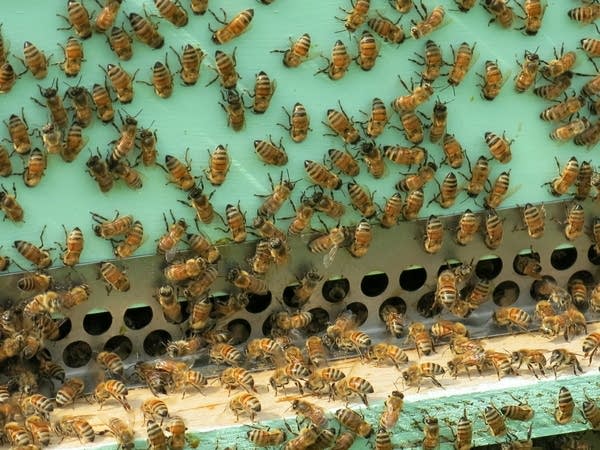Honeybee officials are raising the alarm about severe colony losses over the past few months. The extent of the bee deaths is still being tallied, but one estimate suggests more than a million colonies have died.
“No one is aware of the massive nature of this year’s die off,” said Steve Ellis, a Minnesota beekeeper. “It is unprecedented.”
Over the past 20 years commercial beekeepers have often lost nearly 50 percent of their bees over the winter. But Ellis, who is also president of the national Pollinator Stewardship Council, said he’s hearing from beekeepers who have losses ranging from 70 to 100 percent this year. One immediate repercussion is that there aren't enough bees to fully pollinate California’s almond crop.
“The almond crop will be impacted due to a shortage of bees in a way that has never happened before,” said Ellis who takes his bees to California to pollinate almond orchards.

In a statement earlier this month, the Almond Board of California said it was aware of “alarming reports of nationwide honeybee colony losses” as beekeepers prepared for the almond pollination season.
Honeybee organizations are collecting data to determine the extent of the losses. A voluntary online survey conducted by Project Apis m., named for the Apis mellifera honeybee, found “severe and sudden” colony losses, according to a recent news release. The nonprofit estimate nearly 1.25 million colonies have been lost since June of 2024.
“Initial survey results of colony losses suggest that commercial beekeepers may have lost in excess of 60 percent of their bees. The scale of these losses is completely unsustainable,” said Zac Browning, a fourth-generation commercial beekeeper from North Dakota and board chairman of Project Apis m.

Researchers are collecting dead bees to look for a cause of the die off.
Commercial beekeepers have struggled with bee losses for about 20 years since a widespread sudden die off was labeled Colony Collapse Disorder. Researchers believe exposure to pesticides, loss of flowering habitat and pathogens all contributed to past losses.
In its news release, Project Apis m. said the trends of this die off resemble past Colony Collapse Disorder events “and may impact pollination services and food security.”
Collected from Minnesota Public Radio News. View original source here.
 Minnesota Public Radio (MPR) is a public radio network for the state of Minnesota. With its three services, News & Information, YourClassical MPR and The Current, MPR operates a 46-station regional radio network in the upper Midwest.
Last updated from
Minnesota Public Radio (MPR) is a public radio network for the state of Minnesota. With its three services, News & Information, YourClassical MPR and The Current, MPR operates a 46-station regional radio network in the upper Midwest.
Last updated from